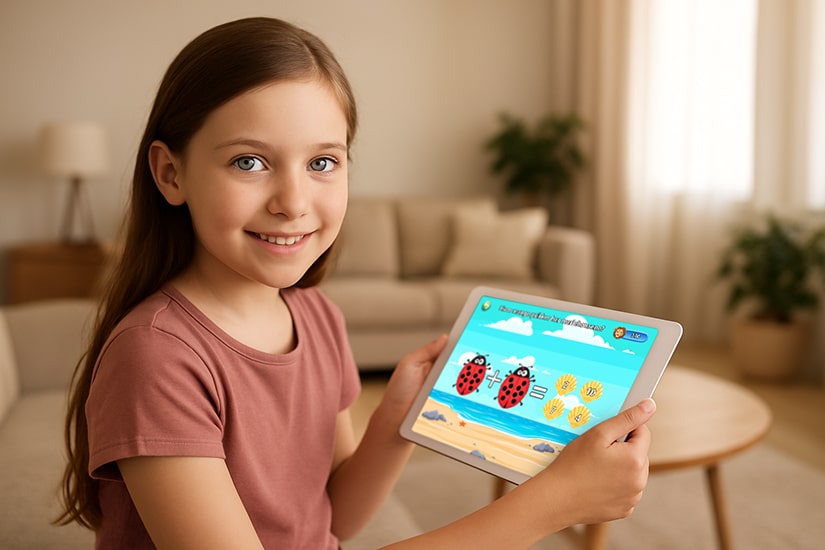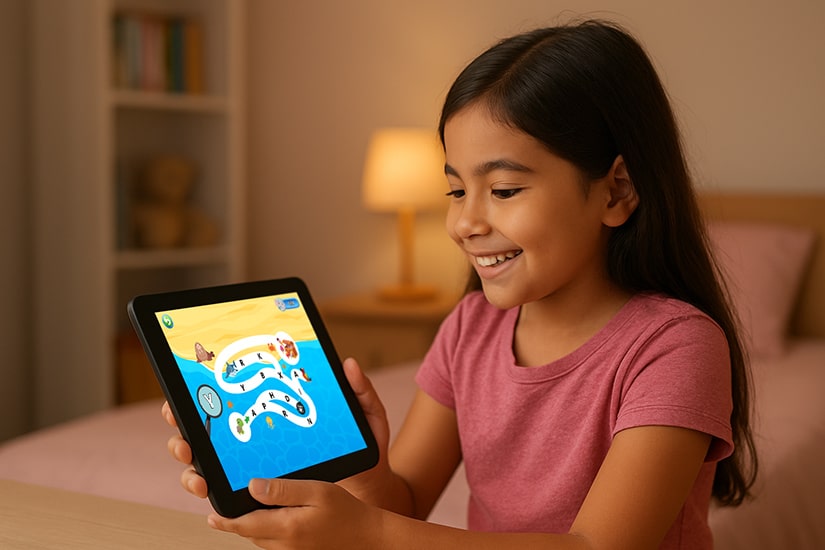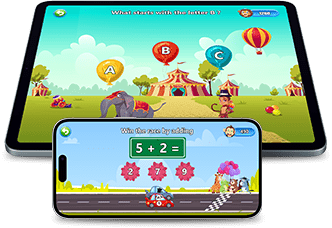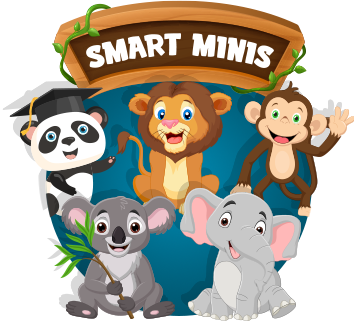Table of contents
The foundation for early digital brain development
The research behind digital learning and its importance for brain development
One of the most striking findings from recent research is how much digital technology enhances cognitive and language development.
A two-year study by Manchester Metropolitan University, “Toddlers, Tech and Talk,” shows that babies and toddlers who use mobile and tablet apps use the senses of touch, sight, hearing and movement in tandem. The combination of the senses activates neural pathways in the brain that support early learning.
The study shows that children don’t just want to be passive observers. They enjoy experimenting, learning and processing what they play with, and this is a great help in mastering learning and problem-solving, from the early years.
Such studies also support how important good learning apps can be for children, and give them some noticeable advantages in later school life.
Interactive learning wrapped in fun play, like in the Smart Minis app, keeps children challenged, problem-free, and having fun playing, while constantly learning new words, letters, math, and the names and appearances of colors and shapes.
How digital play strengthens learning and social development
Digital learning supports problem solving
Digital learning apps differ from popular apps like Instagram, Snapchat and TikTok, which are used only for entertainment. A significant advantage of educational apps is that, in addition to entertainment, they train skills such as problem solving, learning and decision-making.
Learning apps with activities such as number games and pattern recognition give children challenges to build logical and mathematical thinking from an early age.
When children receive positive feedback after solving tasks correctly, it builds their self-confidence and desire to solve new challenges without it feeling like a boring duty.
Apps that reward with points and positive feedback, such as Smart Minis math and shapes games, are a huge help for parents who want to give their children a good start in life. When using learning apps that are fun and use positive reward elements, parents can safely hand over the mobile or tablet to their child without feeling guilty about screen time. Educational apps are a much better alternative than the almost pointless alternatives like TikTok, Snapchat, etc.

The math game shown is from the educational app Smart Minis
Digital tools strengthen communication and language
Language development comes from playing with language and being frequently exposed to words, both written and read aloud. Apps that contain both speech and text are the most effective when it comes to learning language. Because here the child can both see how the words are spelled and hear how they sound when pronounced. This is also something multilingual families benefit from, even if the children are a little older.
The study from Manchester Metropolitan University supports that when children read and hear words, they begin to play with language themselves, develop their vocabulary and become aware of new sounds they have not heard before.
The Smart Minis app supports word play through read-out texts and mini-games that increase vocabulary. In the fun mini-games, emphasis is placed on including the most frequently used words in the English language, so that children can quickly learn them. This provides an early basic knowledge of not only words, but also the composition of sentences. In addition, children also learn to write the letters from A to Z by drawing on the screen themselves.


Digital learning in childhood
Proliferation of learning apps for children
In large parts of Europe and the US, digital tools are increasingly integrated into daycare centers. A report from the Danish Social Development Center (SUS) show that tablets installed with learning apps support creativity and learning, and they are easy to use, as they are mobile and close at hand.
How the apps are used varies depending on the child. Some children are good at collaborating on solving tasks, while other children get more out of exploring on their own.
The Smart Minis app can be used alone, where the app guides them with praise and encouragement when solving tasks, but also works very well in the company of other children or parents, where the tasks are solved together and invite conversation.
Introduction to digital understanding and critical thinking
It has been a long time since the use of digital media was only for teenagers and adults. Now it starts already from the earlier years, which gives parents a great responsibility for how digital media is used correctly.
The report from SUS shows that when daycare institutions introduce digital tools, children learn very quickly how to use them. Children are not afraid to ask questions about why things happen as they see on the screen, how the buttons work and they quickly learn that their choices affect whether it is a right or wrong answer.
Learning apps like Smart Minis support this teaching method. For example, when a character responds to a child’s wrong choice with encouragement, or the right choice with praise and points. The points that the child is rewarded with can be used in a reward store, where the child can buy clothes or food for their virtual pet.
This opens the door to a simple but effective way of teaching, as curiosity and correct answers are rewarded, and the child quickly learns that when they acquire knowledge, they get something good out of it.
The American Educational Research Association (AERA) finds that new research identifies strong link between childhood opportunities and educational attainment and earnings.
With the right apps, digital learning is part of healthy development.
What experts and researchers think about digital exposure and learning
Educators and experts endorse correct use of digital exposure
Experts in early childhood education believe that children benefit more from digital use than the opposite. Instead of protecting children from technology, they should be introduced to the digital world from primary school onwards.
The U.S. Department of Education has published the National Education Technology Plan (NETP), which provides a vision for the future of technology in education. This document emphasizes the need for digital equity and the importance of teaching digital literacy. It also underscores that while technology can enrich learning, correct use is essential for maximizing its benefits.
Research and involvement
The American Academy of Pediatrics (AAP) has published multiple statements on the impact of media on children’s development. Their guidelines on “Media and Young Minds” provide recommendations on how to use digital tools appropriately for young children. The AAP advocates for interactive media that promotes learning rather than passive screen time.
Smart Mini’s app is designed based on the philosophy of “learning through play”. It has been important to design the user interface in a beautiful design and child-friendly colors. This is seen across the learning modules in the Smart Minis app, all of which are easy to understand and navigate, whether the child wants to learn English, math, colors or shapes.

The letters game shown is from the educational app Smart Minis
Concerns about screen use
Some studies point out the risks associated with excessive screen time, especially when children use digital media passively without feedback or interaction. For example, by doom-scrolling on social media.
Media and communication researcher Nancy Baym from Microsoft points out that digital hysteria can be caused by the three phases of technology. First, we become euphoric because of a new technology, then a general skepticism and moral panic spreads, and finally we end up gaining a great deal of knowledge about the technology so that we can use it in a critical but productive way. Right now we are in the second phase of technology.
However, the latest studies are already showing that the psychological, social and cognitive effects of digital media do not actually have the severe disadvantages that we have feared. In fact, strict cell phone rules in schools have no effect on grades or better student well-being, according to a master’s thesis from Denmark based on 108 elementary schools.
Although further research in this area continues, there is no reason to forego useful digital education.
On the contrary. There are countless studies that support the value of early language learning, math, and other learning activities, such as learning shapes and colors.
Smart Mini’s approach and the future of digital learning
Smart Minis: Made with the Most Effective Teaching Tools
Smart Minis includes many of the elements that research has shown to be the best teaching tools. The teaching app avoids overstimulation with frequent image changes and instead focuses on calm graphics, simple interactions, repetition and guided instructions. Elements that help improve early reading skills, memory, motor coordination and task understanding.
The app’s character-driven activities and playful learning mini-games, such as when the child learns math with ladybugs, chooses letters in the circus, learns the names of the colors of the rainbow or learns to recognize and remember shapes in the fun memory game, encourage all children to investigate, think and decide. The structure is deliberate. Each interaction gently reinforces early learning by rewarding concentration, understanding the task text and decision-making.
A positive vision for the future
When parents and educators use Smart Minis thoughtfully, digital learning becomes a powerful complement to traditional play, teaching and everyday conversation.
Rather than opting out of learning for young children for fear of harmful exposure to mobile phones and tablets, experience shows that there are great advantages to learning through, for example, apps. They also show that the fear of harming children probably stems more from a lack of experience with digital education.


Conclusion
Digital learning through apps supports brain development in early childhood when the app is designed correctly. Learning apps help teach language, math, problem solving and encourage more learning due to the success and reward factor.
By drawing on current research, educational initiatives and a child-centered design philosophy, Smart Minis offers a safe and effective digital learning environment for young children.
The Smart Minis learning app is based on the most important elements of effective teaching our young children and is designed specifically for 2 – 7 year old children.
The app, which contains teaching of language, math, colors and shapes, can be found on Smart Minis.






